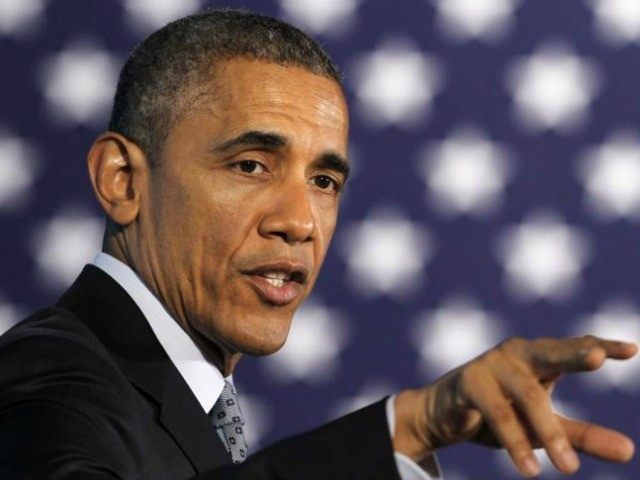President Obama sent out his annual Nowruz (Persian New Year) message on Thursday, hoping to “speak directly” to the “leaders” of Iran in a highly politicized message meant to garner support for an upcoming nuclear deal with the Islamic Republic.
In the video, the President mischaracterizes the reality of Iran’s political system, while trashing dissenters of his upcoming nuclear deal with Iran. He even finds time to praise Iran’s dictator for his supposed fatwa against nuclear weapons–and speaks of Iran’s “leaders” as if the despotic regime is governed by a legitimate parliamentary democracy.
President Obama states:
The days and weeks ahead will be critical. Our negotiations have made progress, but gaps remain. And there are people, in both our countries and beyond, who oppose a diplomatic resolution. My message to you–the people of Iran– is that, together, we have to speak up for the future we seek.
The President seems to imply that critics of the Iran deal–such as the vast majority of Congress, the State of Israel, and other American allies–are the “people” in “our countries and beyond” who “oppose a diplomatic solution.” In framing his statement, Obama suggests that those opposed to his nuclear deal want to go to war with Iran, and that their concerns over a bad deal are not legitimate.
The President continues:
As I have said many times before, I believe that our countries should be able to resolve this issue peacefully, with diplomacy. Iran’s Supreme Leader Ayatollah Khamenei has issued a fatwa (religious edict) against the development of nuclear weapons, and President Rouhani has said that Iran would never develop a nuclear weapon. Together with the international community, the United States has said that Iran should have access to peaceful nuclear energy, consistent with Iran’s international obligations.
There is no evidence that the Ayatollah’s fatwa against nuclear weapons exists. By recognizing the Ayatollah’s dictatorial rule as legitimate, the President is helping to surrender the future of the Iranian people to a despotic regime. Furthermore, Iran is the world’s foremost state-sponsor of terrorism. It has executed countless Americans abroad, and domestically, is setting a record-pace in slaughtering its own citizens. Why the President gives Iran the benefit of the doubt when its ruler states–without any evidence or verification–that there is some sort of religious mandate not to develop nuclear weapons, remains unclear.
President Obama adds:
In this sense, Iran’s leaders have a choice between two paths. If they cannot agree to a reasonable deal, they will keep Iran on the path it’s on today—a path that has isolated Iran, and the Iranian people, from so much of the world, caused so much hardship for Iranian families, and deprived so many young Iranians of the jobs and opportunities they deserve.
President Obama continues to speak of Iran’s “leaders” as if anyone other than the Ayatollah would have a final say on the nuclear deal. His White House has frequently decried congressional efforts to institute further sanctions, citing how “sensitive” the negotiations remain, largely because of a supposed friction between Iran’s “hard-liners” and reformers in Parliament.
But in reality, only a tiny percentage of candidates who seek higher office in Iran are deemed “qualified” to even run in an election and represent the Islamic Republic. Iran’s Council of Guardians, which is the body that decides who can and cannot run for office, is hand-picked by the Ayatollah. Others have suggested that the ballots are completely rigged for the Ayatollah’s preferred candidate, even if reform candidates make it to election day. Therefore, there is no real tension between the “hard-liners” and reformers because those who overtly seek a real change in Iranian society either never make it to the ballot box or never have a legitimate opportunity.
Mr. Obama concludes:
This is what’s at stake today. And this moment may not come again soon. I believe that our nations have an [sic] historic opportunity to resolve this issue peacefully–an opportunity we should not miss. As the poet Hafez wrote, “It is early spring. Try to be joyful in your heart. For many a flower will bloom while you will be in clay.”
For decades, our nations have been separated by mistrust and fear. Now it is early spring. We have a chance–a chance–to make progress that will benefit our countries, and the world, for many years to come. Now it is up to all of us, Iranians and Americans, to seize this moment and the possibilities that can bloom in this new season.
In his Nowruz statement and throughout the nuclear negotiations, the President has failed to address Iran’s overt backing of terrorist groups Hamas and Hezbollah throughout the world, and has ignored the threat posed by Tehran’s sophisticated ballistic missile program.
Perhaps the reason why the vast majority of Americans “mistrust and fear” the Iranian regime is because it continues its opportunistic efforts to kill Americans. Iran and its proxies have taken countless American lives over the past few decades. In 1983, Iranian-backed terrorists bombed the U.S. marine barracks in Beirut, killing 241 U.S. soldiers. Additionally, experts have alleged that Iran played a key role in facilitating the 9/11/01 attacks against America. High-ranking U.S. officials have displayed that Iranian-supplied IEDs (Improvised Explosive Devices) have taken countless American lives during the war in Iraq.
Take it from U.S. General David Petraeus, who stated on Friday that Iran poses a greater threat to U.S. national security than any other terrorist entity, without even taking into account its nuclear weapons program.

COMMENTS
Please let us know if you're having issues with commenting.